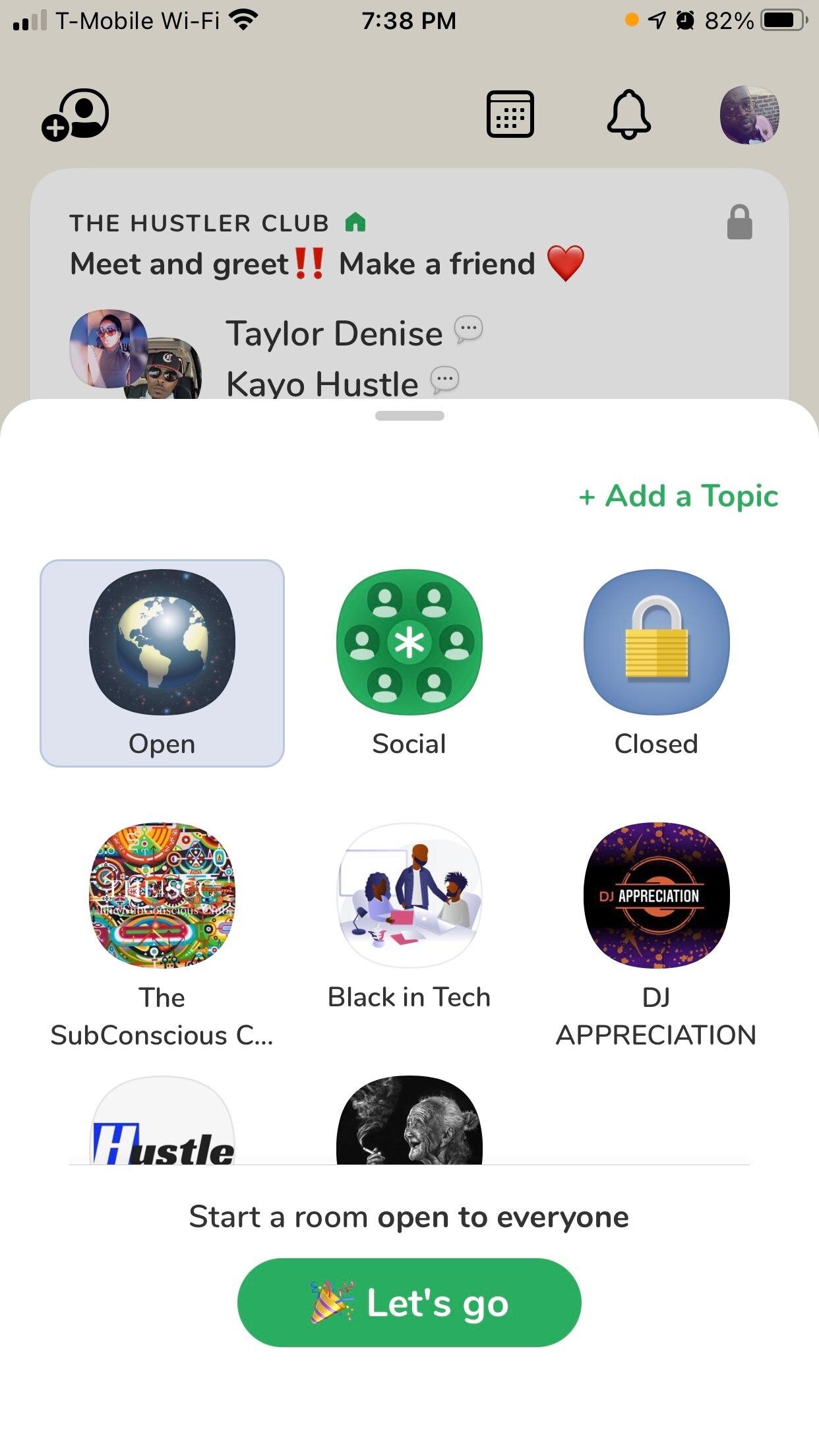I enjoy having a lot on my plate. I am a wife, mom, Program Manager, Praise and Worship leader, Coach, Podcast Host, Public Speaker, and content creator. I use Project Management Systems to project manage my life so that I can accomplish everything I want to do.
Clubhouse - The Basics
So many have heard about Clubhouse (CH) but don't know what it is or how it works.
First and foremost it is currently is only for iPhone users. I am an Android user (Yes, and I still refuse to cross over leave Android lol But it seems my business line will be an iPhone - sigh) however my husband is an iPhone user and has been one of the chosen few who have received an invite. If you cannot get an invite you can also try by joining the waitlist. Let’s start with the basics:
The clubhouse is still in beta and is by invite only.
This is a chat-based (audio-only) social media app.
You can participate in different chat rooms on a WIDE range of topics.
Nothing is saved on Clubhouse.
While the appeal is there, even if you are blessed with an invite, people don’t know how to navigate the new Clubhouse world. Here are a few tips and tricks to get you started:
Your profile: Here is your opportunity - share who you are, what you do, or what you are wanting to achieve on CH. Share how people can get in contact with you - Your Twitter handle, IG, LinkedIn, Youtube channel, or your personal website.
Following: You can build your following by networking in different rooms. You can only ping (or pull) someone into a room if they are following you.
Group: There are multiple groups within the Clubhouse. Examples are “Black In Tech”, “Hustlers Club”, “Creative Executive Officers”, “Community Club” and “Money is on LinkedIn”
Starting a room: You have the ability to schedule a room. Starting a room within a group helps your visibility to more individuals.
Moderating a room: As the moderator our responsibility is to move the conversation along and facilitate the room.
Set up the room - state the purpose of the room.
After 2 speakers always reset the room - restate your name and the purpose of the room.
Ask people to add 5 people who need to listen in to this conversation.
As the owner of the room, you can make someone a speaker or a moderator.
You have the power to mute someone or move them back to the audience.
Inviting someone to the stage: Think about CH as a fluid virtual presentation/conference. You can invite someone to the stage to speak. Then as the facilitator, you call people in order to unmute themselves and speak. One important acronym is PTR Pull to Refresh - when you pull down the screen it refreshes the stage.
Lastly, if you leave the room and come back, you keep your status in that room - as a moderator or speaker.
How to applaud: When you continuously tap your mic that is considered applauding someone's comment.
The app piqued my interest because this platform is a fantastic way to network and learn. I have met so many amazing people within my industry. I have added them to my LinkedIn and IG network. This new network has shared job opportunities, new platforms for job search (VentureLoop, and Linkup I wasn't aware of) as well as intern opportunities. I have recruiters and executives on this platform. People share encouragement, learning platforms (like Percipio) and tips on how to grow within your industry.
I hope this blog helps those who felt as lost as I did when I first jumped on to CH. For now if you are interested in following me I speak on Sundays under Cory Sargeant’s profile - until my iPhone comes.
Until next time!!
My next blog post will be in January 2021!!
Lots of love,
Donna
How do I become a PM?
A friend of mine asked, "how do I break into Project Management?" Another friend asked, "is what I'm doing considered Project Management?" One of the first things the PMBOK teaches you is that a project is any task that you work on that has a beginning and an end. A project is a finite amount of time. The initiative can be a month or 3 years. Theoretically your work as an executive assistant, a coordinator, a banker, a coder, a manager or any role has given you transferable Project management skills.
Being able to market yourself as a Project Manager can help you land that role. Below I've outlined a few tips and tricks to breaking into the Project Manager Industry.
Educate yourself - there is so much information out there about Project Management. There are so many industries PMs work in, so many methodologies, there are blogs, communities and reading materials on best practices as a PM. Read an article or book, attend a meetup or a PMI meeting. Below are sites that can start giving a glimpse into Project Management and certification available:
Revamp your resume - Find the best way to market the work you have done, show that you know how to manage priorities, work with a team, communicate with executives. Demonstrate with your experience that you are ready to step into a role as a project manager. There are hard skills and soft skills that you can promote that will build your credibility. Here is a great example of a PMs resume - https://novoresume.com/career-blog/project-manager-resume
Be confident and engaging while interviewing - As a PM you meet with your supervisors to keep them up to date on the project and possibly budget/burn. On a project there are typically stakeholders you must keep informed of progress and the delivery team must be engaged and motivated. Below are examples of topics I’ve discussed on interviews in the past
Documented weekly check ins with the client tracking milestones
Managing team conflicts
Burn down charts
Pivoted Budget data to depict business insights
Quarterly Retrospectives with the team to learn from past efforts
Lastly talk to someone in the industry to get an idea of a day in the life of that role. When doing an informational interview here are great questions to ask.
How did you get your start in this field?
What is it like working at your company?
What types of projects are you working on right now?
What’s your opinion on Project management in different industries?
How did you choose this company or position over others in your field?
What is the most rewarding thing about working in this industry? The most challenging?
My background is in XYZ —how do you think I can best leverage my previous experience for this field?
What do you wish you had done differently when you first started at your career?
What job search advice would you give to someone in my situation?
What does a PM do?
A little about the PM role and responsibilities regardless of the industry:
Planning: Project managers plan and schedule before executing the project. The planning of the project helps to identify how the project is advancing and whether the team is adhering to the timelines or if there has been an addition to the project.
Communicate: Project managers must communicate with the team - about the timing and scope, management - about the budget, the temperament of the client and about the progress of the project.
Managing resources: PMs must manage and track the project resources closely, especially people, efficiently.
Boosting team morale: People management is an important aspect of a PM role. Because Project Managers work with a lot of people they should ensure that their teams’ effort should not go unrewarded in the end.
Controlling the scope and cost: Project manager ensures to control cost overrun and the resources are tracking against what was estimated. PMs are responsible for completing the projects within project budget. In case of any deviation, they notify stakeholders well in advance. And, hence cut the chances of last moment surprises as much as possible.
I do plan on writing a blog about the many different industries PMs work within.
PMP Certified
I took my Project Management Professional exam 3 times. It was a hard exam. While I know the fail rate for the PMP exam is pretty high at an estimated 40-50% for first-time test-takers. I was still upset it took that many tries to pass but I knew that I couldn't give up. The PMP exam is a $555, 4-hour long exam with 200 questions. You cannot pass the exam merely by memorizing facts or the ITTOs. ITTOs are the Inputs, Tools, Techniques, and Outputs of Project Management. They are the foundation and infrastructure of the Project Management processes discussed in the PMBOK® Guide. You have to understand them. There are also formulas and mathematical equations on this exam.
PMI® announced that the PMP certification exam will change on December 16th 2019 when they release a new PMP Exam Content Outline. It was one of the hardest exams I've ever taken but I don't regret it at all. I was acknowledged by hiring managers as an expert in my field and my salary requirements increased as well. I don't think anyone needs to have a PMP certificate to be a great Project manager but I do believe without question that it improves your options for the future.
There is a sense of pride that comes with the accomplishment of being certified. The studying equipped me to be ready for my roles. It is widely known that the exam is idealistic in its scenarios. There are things you don't learn from studying, how to manage an angry client or a burned-out team but I hope to share my experiences here to help others.





